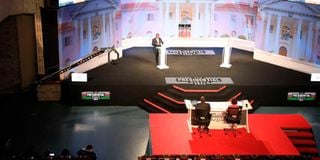Premium
The presidential debates, audience responses, and ‘gotcha journalism’

The presidential debate that ended on Tuesday night is not yet over. Questions linger on its format, fairness, rules, and the right type of questions to ask. But first things first. It was a sterling organisational effort.
The presidential debate that ended on Tuesday night is not yet over. Questions linger on its format, fairness, rules, and the right type of questions to ask. But first things first. It was a sterling organisational effort.
Congratulations to the Presidential Debates Secretariat for pulling off such a win even in the face of a boycott by two of the most colourful of the four presidential candidates.
Lingering questions
For the lingering questions, let’s start with the kind of questions asked by the moderators. On the whole, their questions effectively drew out useful and relevant information. However, a few of the questions were manipulative—loaded or trick questions of the “Have you stopped beating your wife?” variety.
The best example was a question by Ken Mijungu in the David Mwaure Waihiga debate. Mr Waihiga, an ordained church minister and senior lawyer, said Kenyans had resigned to voting in old corrupt leaders but he was offering hope. Mr Mijungu then said: “Maybe it’s because you’ve not got the opportunity. That is why you can stand tall and say you have not been involved in any corruption. Perhaps if you have had the opportunity…”
The complex question was a fallacy. It carried presumption of guilt and was phrased in a way it couldn’t be answered without self-incrimination. It condemned Mr Waihiga as corrupt at heart; it didn’t matter what he said in his reply.
In many cases, in fact, some moderators seemed to relish “Gotcha journalism”. This is a term derived from the word “gotcha”, a contraction of “got you”. It describes interviewing techniques that appear designed, as political scientist Peter Russell has said, “to entrap interviewees into making statements that are damaging or discreditable to their cause, character, integrity, or reputation.”
Cheered, jeered and laughed
At the beginning of each debate segment, the moderators said the questions they asked were entirely their own. Would it not have been better to also allow some direct questions from the audience so that the voices of Kenyans could be heard without the mediation of the moderators? This was done in the Waihiga debate in which two pre-recorded questions were video-taped. But the other five debate segments didn’t have direct questions from the people.
The debate rules required the audiences not to cheer or jeer or make any other noise. But the audiences cheered, jeered and laughed, anyway. What was the point of having a rule that couldn’t be enforced? If the rule was so important why not get rid of the audiences?
The purpose of the rule was not explained, except to say it was decorum. But was it because the audience audible responses would disrupt the proceedings? Influence those watching the debate on television?
Communication dynamics
In fact, the audience responses were part of the debate group communication dynamics. The responses provided indications of the candidates appeal and memorable moments of the debate.
For example, questioning DP William Ruto’s land-acquisition prowess, Eric Latiff asked “How much is enough?” the DP replied: “Enough is enough” and the audience burst into laughter. The DP also joined in, laughing. Without the laughter, the reply would not have been so meaningful.
The rules also banned written materials or notes. What was this rule supposed to achieve? To identify candidates who can think on their feet without notes or effortlessly cite facts and figures learned by heart? Is this meant to be a measure of good presidential material? DP Ruto’s running mate Rigathi Gachagua broke the rule. He read a Gazette notice to prove a point.
Incidentally, the moderators themselves read from notes to pin down candidates on things they said in the past. Just a question: Would it not be better to leave it to viewers to decide who would be a better presidential candidate with or without notes?
Mathematical chances
Finally, the candidates seemed to have been assigned to debate segments depending on their mathematical chances of winning the election. Since we don’t know what will happen on August 9, might it have been fairer to have all the four candidates appear together?
As we await the next debate in five years’ time, the organisers should take time to settle these lingering questions.
They should ensure public education on the debate format and rules. It’s only with public support that the debate can become part of our democratic tradition so that no candidate can refuse to take part in the debate without consequences.
The Public Editor is an independent news ombudsman who handles readers’ complaints on editorial matters including accuracy and journalistic standards. Email: [email protected]. Call or text 0721989264





